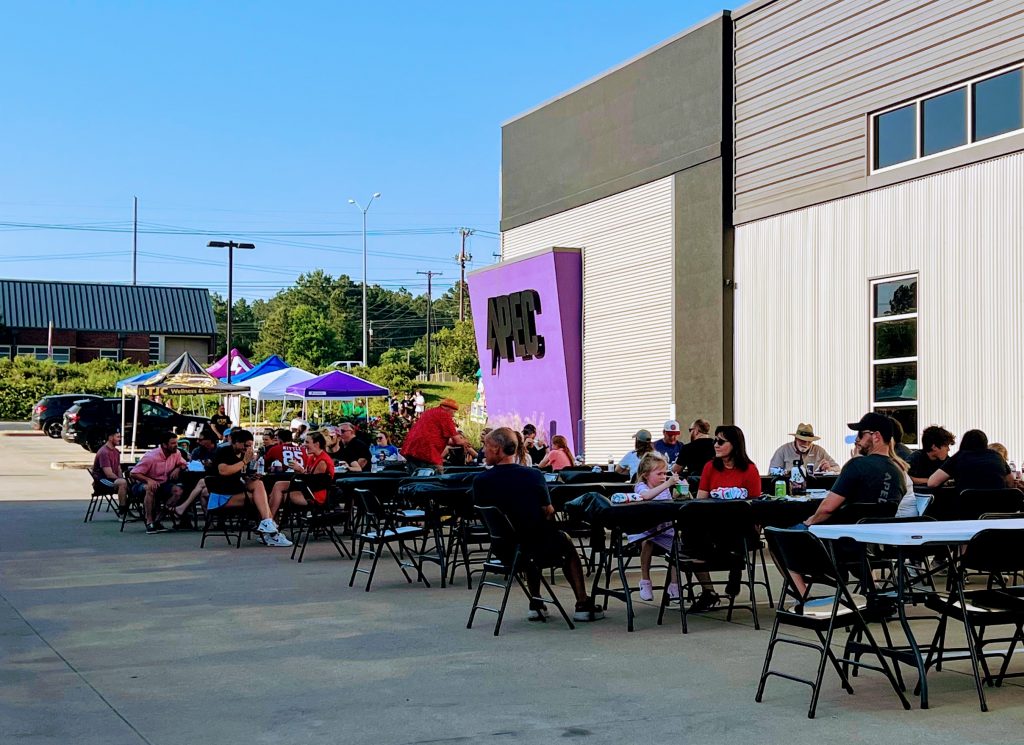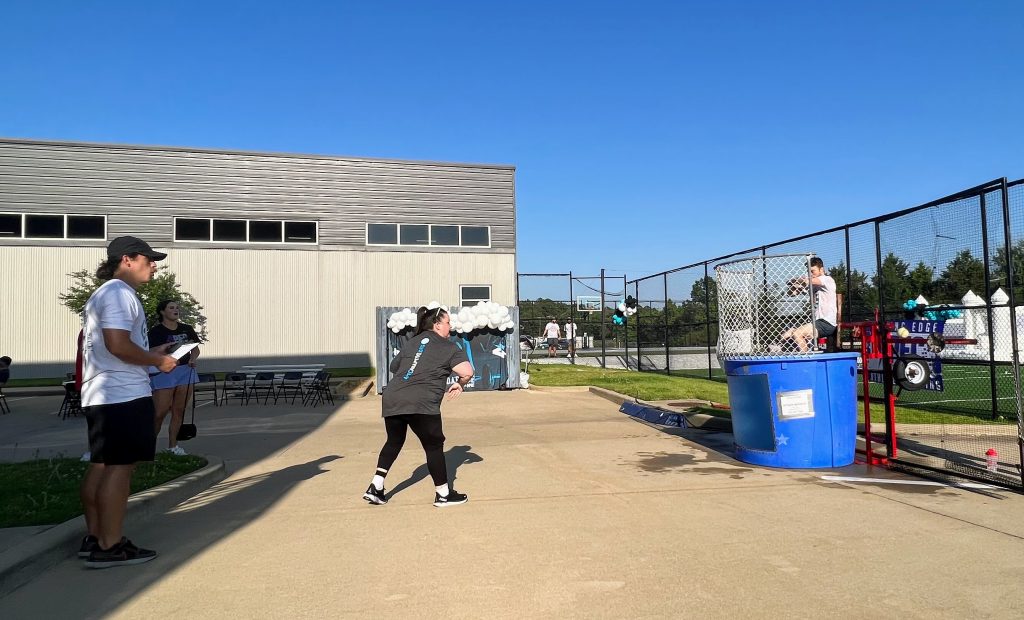Deciding to join a gym can be intimidating. Just the thought of getting past the anxiety of being seen in spandex may stop some before they ever start.
Navigating through the plethora of gyms available in Tyler can be even more daunting, especially for people with a disability. Not all Tyler gyms are accessible or affordable for someone with a disability.
So, it’s a win when one can feel confident enough to safely workout.
The Athlete Performance Enhancement Center in Tyler might be more well known for being a high-performance gym for professional athletes like Patrick Mahomes.
But APEC is also one of the only gyms providing disabled Tyler residents with tools and resources required for building and establishing healthier lifestyles.
In May, APEC officials organized the gym’s second annual block party fundraiser for the Adaptive Foundation.
The Adaptive Foundation began in 2018. It is a non-profit organization funded primarily through donations. The foundation provides resources and experiences to people with disabilities wanting to improve their physical health.
Doug Leighton, general manager of APEC, said he raises funds throughout the year and uses them however he can.
In the fall, APEC officials plan to sponsor its second annual golf scramble.
“A lot of the resources that I have easy access to involve health and so I can train and do general health, or I can do performance,” Leighton said.
He said while health is APEC’s cornerstone, they want to have the ability to provide more to the community.

“We help people with special needs of some sort be healthy and at least have the base resources for health. And then sometimes we go into performance, and so we’ll have kids that are competitive in the Paralympic world,” he said.
Caleb Daley is an athlete of the Adaptive Foundation and has spina bifida. Daley trains and competes in marathons using an adaptive hand cycle, and he learned about the adaptive program while competing at a Fresh 15 race in Tyler.
Daley said the foundation has helped him gain confidence, strength and self-discipline.
“APEC has not only improved my time on my racing, but it has also helped me gain strength mentally and physically as well as learn more about myself as a person,” Daley said.
The foundation began through APEC’s founder Bobby Stroupe.
“Bobby is a visionary. He can predict … the general flows of what markets will happen in the performance and health world.” Leighton said. “So, there’s not a lot of self-help opportunities and there’s no one that was doing health in that realm, especially in performance.”
Stroupe saw a need in Tyler. While there are other adaptive foundations available in the U.S., there were none in Tyler.
The foundation helps a wide variety of people including those with mental or physical impairments.
Leighton said they have worked with people who have autism, Down syndrome and spina bifida, as well as amputees and those with spinal cord injuries.
While the foundation provides services to people with different disabilities and of all ages, there are certain limitations.
“What we do is we help people that are not needing to be in a hospital, or not needing a certain level of therapy,” Leighton said. “We have to stay within our realm. I can’t go in and provide surgery or act like I’m a doctor and do therapy of some sort.”
“I have to do health, and health a lot of times picks up and cleans up a lot of the problems. My focus is health around what’s happening and not trying to change what’s happening,” he said.
The foundation is working on providing resources for people with autism. While they continue to train the people who are already in the program, APEC also wants to provide an adaptive physical education program throughout the entire school year, every year.
The foundation provides all its services for free to qualified applicants. Leighton works year-round fundraising to provide these services.
This year’s block party included a barbecue and live rock music. The event also had attractions for children including a bounce house, ball pits, horses and ponies and a clown with free balloons.
“We’re trying to make it a real big family experience and we’ve been very fortunate to have some local businesses be consistent in showing their financial love and belief in what we’re doing,” Leighton said.
While fundraisers such as these provide some financial assistance, Leighton said there is still a great need for donations.
“I’m trying to make it where we have a lot of people that are donating $1 to $10 a month and we just have thousands of people doing that because they know the story and believe it,” he said. “That’s where we want to get to and then have these events as add-ons.”
“Right now, fundraisers like the block party are a huge deal,” Leighton said, “It’s all we have besides very few people that are on that subscription.”
Amanda Rogers is an adaptive athlete at APEC. Rogers was 2 years old when she had her first surgery to remove a brain tumor. Six months later, it regrew and infiltrated her brain stem. The extensive surgery resulted in paralysis in her left arm and leg.

Rogers said initially she was nervously excited about going into the adaptive program.
“I have never been comfortable working out before, but everyone at APEC, especially Tre and Doug, made me feel right at home and put my fears to ease about working out in a public space,” Rogers said.
Rogers said the foundation has benefitted her life and has helped her for the better.
“It has helped me gain much more self-confidence to try new things, and I feel better about myself,” Rogers said.
She said training with APEC helped her improve her gait.
“I walk better now with doing APEC than I have in the 40 years since I’ve been disabled,” Rogers said. “It helped me to strengthen my left side, especially my left leg which was my main concern going into the program.”
Rogers said Tre Jackson, the foundation coach, talked to her in-depth, and helped her reach and surpass her goals.
Jackson has been a coach at APEC for four years. He understands the fears that come from trying new experiences.
“Change is scary, right? When you have something new that you’re not familiar with or you’re uncomfortable with, it’s scary,” Jackson said.
“Walking into something new is going to make that anxiety spike,” he said. “We don’t know what can come from stepping into a new building around new people.”
Jackson sympathizes with newcomers having anxiety from past experiences.
“We’re not going to win every battle, but we’re going to have an impact on the people that do come in here. We just hope that …we help individuals see themselves [as] more than they saw before.”
Jackson said he tries to encourage those who suffer from anxiety to reach out and have that first initial conversation.
“Just come in and just ask about it,” Jackson said. “I think our people do a great job.”
“You never know what you can do until you try and when it gets hard, we adapt and overcome, no excuses,” Daley said.
Foundation workers know about the stereotypes and stigmas that surround health and the disability community.
“I get it, it’s not easy. None of us choose the cards that we’re dealt, none of us choose our parents, none of us choose any of these things. We just get the hand we get and then we have to operate within that world,” Leighton said.
“The hardest part for people walking through those doors is there are a lot of different flavors of life in humans and not everyone is trustworthy,” Leighton said. “People have been made fun of or have very negative self-talk or they’re just in a very negative, downward spiral in different adaptive communities.”
“Something that I believe our team is amazing at is being empathetic and sympathetic to what’s happening and showing that we love who is in front of us.”
“At the end of the day, I can’t do it for you. I can love on you and help you have the tools to do it.”
Rogers advises anyone experiencing anxiety about reaching out to the adaptive program to just give it a try.
“Don’t be afraid to try, because it is going to make you feel better and you’re going to benefit from this,” he said.
For more information about joining APEC’s Adaptive Foundation call (903) 939 2732 or visit https://www.apecadaptive.org/.
Sorayda Rivera graduated from Tyler Junior College with an associate’s degree in public relations and advertising. While there, she wrote for the school newspaper, The Drumbeat, and won five Texas Intercollegiate Press Association awards. She is now attending The University of Texas at Tyler, studying mass communications.
Love what you're seeing in our posts? Help power our local, nonprofit journalism platform — from in-depth reads, to freelance training, to COVID Stories videos, to intimate portraits of East Texans through storytelling.
Our readers have told us they want to better understand this place we all call home, from Tyler's north-south divide to our city's changing demographics. What systemic issues need attention? What are are greatest concerns and hopes? What matters most to Tylerites and East Texans?
Help us create more informed, more connected, more engaged Tyler. Help us continue providing no paywall, free access posts. Become a member today. Your $15/month contribution drives our work.







